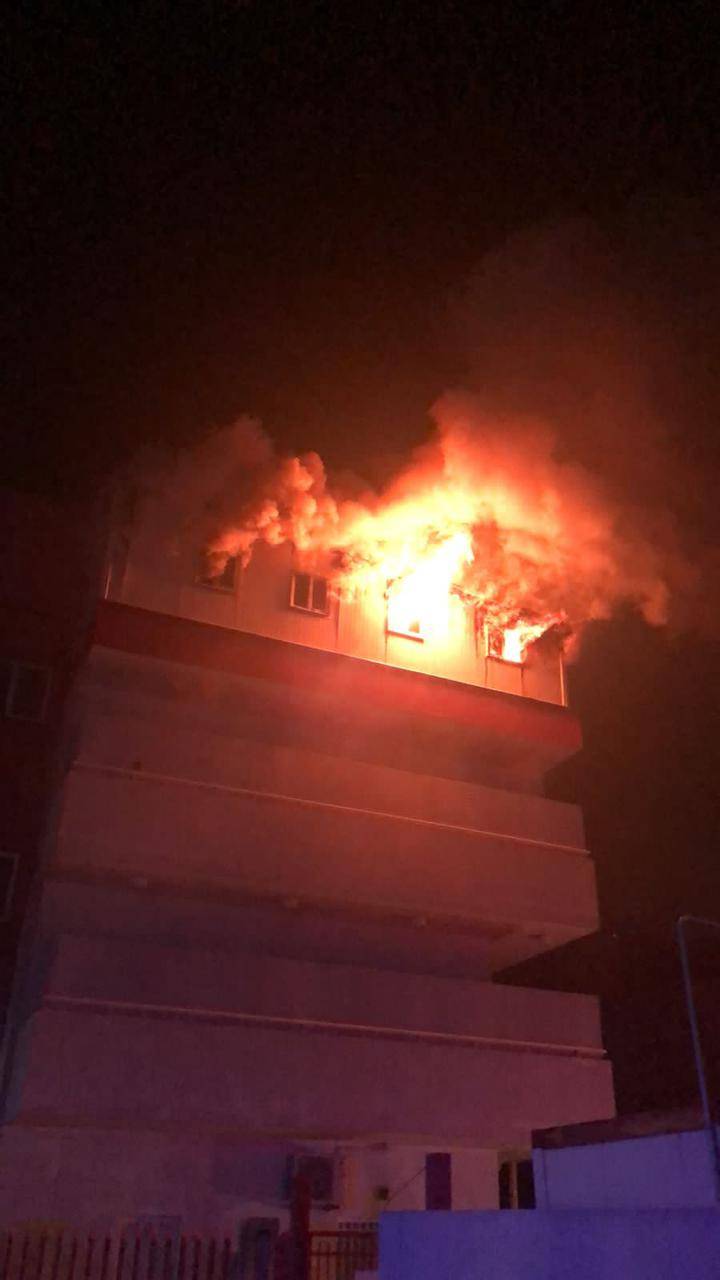
A structure on fire burning in the Doctors Without Borders hospital in Bar Elias. (Credit: Lebanese Civil Defense Twitter)
Want to get the Morning Brief by email? Click here to sign up.
Lebanon’s Economy Ministry said it has “serious plans” to build two new grain silos, while Caretaker Environment Minister Nasser Yassin said that the northern side of the Beirut port silos is at an “increased risk” of collapse. Fires have been continuously raging at the silos for the past weeks, reportedly due to the exposure of the fermented grains therein contained to summer heat. On Tuesday, the Ministries of Health and Environment issued instructions to follow in case the structures collapse. Meanwhile, Economy Minister Amin Salam told the Associated Press in an interview that “several countries,” are interested in funding and bidding on a contract to build two new grain silos to fight the country’s worsening food security crisis, adding that there has been “very serious interest from Germany, the United States, France, and even more serious interest from the United Arab Emirates.” This comes a few months after the cabinet approved demolishing Beirut’s port silos in April, which received backlash from activists and families of the victims of the Aug. 4 explosion.
“Where is the sovereignty and the resistance?” Halimé El Kaakour, “Forces of Change” MP, asked Wednesday, criticizing Parliament’s refusal to push forward a law proposal to amend Lebanon’s maritime borders in its legislative session Tuesday. Parliament rejected an expedited law proposal that would move to consider Line 29 Lebanon’s maritime border with Israel, adding 1,430 square kilometers to the country’s maritime borders and partially encompassing the Karish field — the site where an Israeli vessel was deployed on June 5, resulting in tensions with Lebanon. Amos Hochstein, the US mediator in the indirect negotiations between Lebanon and Israel, received Lebanon's official position on the border demarcation during a visit in June. On Monday, President Michel Aoun announced a visit from Hochstein at the end of the week; however, US State Department spokesman Ned Price told al-Hurra TV on Tuesday that he has “no information to share” regarding the matter.
A fire broke out at a Doctors Without Borders (Médecins Sans Frontières) hospital in Bar Elias in the Bekaa Valley yesterday evening. Firefighters from “more than seven” Lebanese Civil Defense centers rushed to the scene, according to a tweet by the Civil Defense. An MSF spokesperson told L’Orient Today that the fire had been controlled, as of 12:30 a.m., adding, “The patients and staff are safe and were evacuated.”
“The statement encourages us even more to remain on the open strike,” League of Civil Servants administrative board member Ibrahim Nahal commented after the additions in employment terms for public sector workers approved by the government yesterday. Civil servants have been in an open strike for over a month to protest working conditions and unsatisfactory compensation. A daily “productivity allowance,” an allocation to cover hospitalization and medical expenses for civil servants along with an allocation to settle part of the dues owed to the National Social Security Fund, which were agreed on by the Ministerial Committee to Address the Repercussions of the Financial Crisis on the Operation of the Public Facility, were considered “cheap talk” by Nahal.
Banque du Liban changed its gasoline import financing scheme yesterday, decreasing the amount payable at the Sayrafa dollar to lira exchange rate to 85 percent and charging the remainder at the parallel market rate. Increased fuel, water and electricity prices were a main contributor to the rise in inflation noted in June, with the price of 20 liters of 95-octane gasoline having increased by 1,489 percent, according to the Lebanese research center Information International. As the fuel crisis continues, Lebanese Forces’ head Samir Geagea yesterday challenged Hezbollah chief Hassan Nasrallah’s claim that he could provide Lebanon with free Iranian fuel, saying “the government should accept Nasrallah’s offer” of free fuel, not because Geagea “believe[s] this will happen, but because the Lebanese people should not be left to unfounded rumors.”
In case you missed it, here’s our must-read story from yesterday: “Ashkal Alwan brings new forms and colors to Mar Mikhael.”